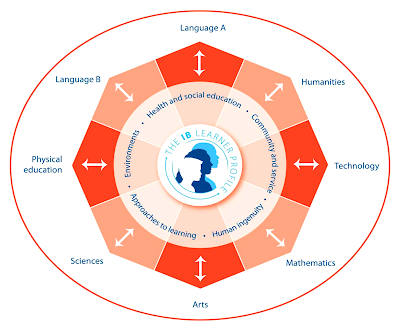The
International Baccalaureate Organization would claim that life-long learners are "
inquiring, knowledgeable and caring young people who help to create a better and more peaceful world through intercultural understanding and respect".
I think that the IBO's definition of a life-long learner is
good, but its not
great! I would argue that
creativity is the missing puzzle piece that completes the life-long learner of
today. The
21st Century life-long learner, must integrate
creativity in order to compete in the global community. Technology is exponentially advancing more than ever and we need creative, critical thinkers to innovate and problem-solve like never before.
I believe that
the life-long learner is a creative, critical thinker, who lets inquiry, knowledge and experience drive his or her learning in order to make decisions and solve problems.
These are two very similar definitions, yet one focuses more on
character, where the other focuses more on
learning. Don't get me wrong, I believe all
contributing citizens should aim to be "inquiring, knowledgeable and caring young people who help to create a better and more peaceful world through intercultural understanding and respect". However, I think that the
life-long learner will aim to be creative, critical thinkers in order to thrive in the 21st Century.
In order to successfully answer this question, let's look at the International Baccalaureate Learner Profile.
All International Baccalaureate life-long learners strive to be:
- inquirers
- knowledgeable
- thinkers
- communicators
- principled
- collaborative
- open-minded
- caring
- risk taker
- considerate
- balanced
- reflective
The figure below displays a Graphic Organizer of a 21st Century learner. In this model, each discipline is equally essential to human development as a life-long learner. Furthermore, each discipline is perfectly integrated in a holistic, well-rounded, educational experience.
This model of the IB learner profile is exactly what it is ... a model of a
profile. I agree that all students should acquire knowledge and character via interdisciplinary education. However, I would argue that what
really matters is
how the learner
applies his or her profile in the real world. Students who attain this well-rounded education will be very knowledgeable and open-minded. But without creative, critical thinking and application, the learner profile remains stagnant.
I feel that while schools still implement this great IB program, teachers still need to teach students how to apply their knowledge to real life challenges. Teachers can't forget to implement challenge-based learning and
project-based learning into the curriculum so that our students will be prepared to think critically and creatively to solve the global problems of tomorrow.
In closing, if we want to prepare our students for their future, then we should not assess them on
what they know, rather we should assess them on
what they can do with what they know.


Comments
Post a Comment